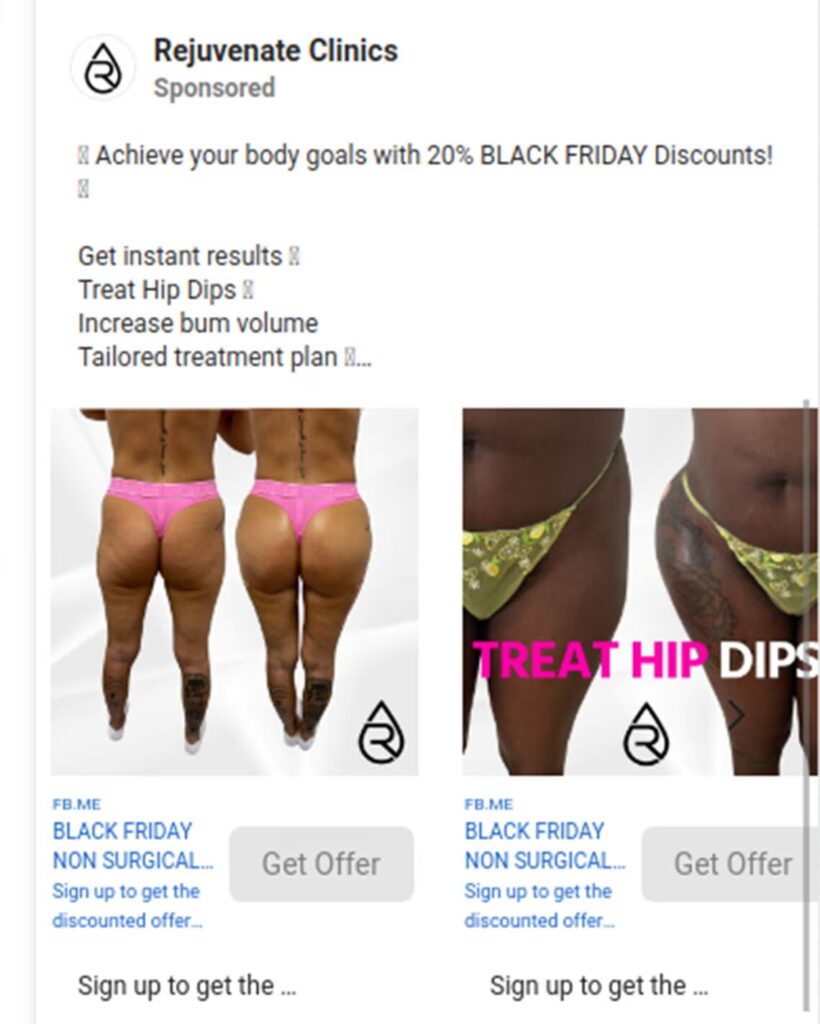Six UK-based clinics have been ordered to pull social media ads promoting a controversial cosmetic procedure known as the liquid Brazilian butt lift (BBL), after the UK’s advertising watchdog ruled they were irresponsible and potentially harmful.
The Advertising Standards Authority (ASA) said the ads exploited body insecurities, trivialised serious medical risks, and used high-pressure tactics such as limited-time deals to push consumers towards procedures that are neither regulated nor without danger. The decision follows growing concerns over the marketing and safety of liquid BBLs, which involve injecting fillers into the buttocks to create a more rounded appearance.
The crackdown is one of the strongest public warnings yet over how cosmetic procedures are being sold to women online, particularly on platforms like Instagram and Facebook, where glossy before-and-after photos and hashtags like #bbltransformation are common.
The ASA’s investigation covered adverts from six clinics: Beautyjenics, Bomb Doll Aesthetics, CCSkinLondonDubai, EME Aesthetics & Beauty Academy, Rejuvenate Academy (also known as Rejuvenate Clinics), and NKD Medical (trading as Dr Ducu). The ASA concluded that each of the ads breached UK advertising rules, citing irresponsible messaging and a failure to accurately communicate the health risks involved.

Many of the adverts featured persuasive language like “perfect peachy look” and “feel confident every step of the way”, suggesting the procedure was safe, easy, and transformative. Others encouraged quick decisions with phrases linked to Black Friday deals or special offers. According to the ASA, this kind of messaging risks coercing individuals into undergoing a medical procedure without enough time to properly consider the consequences.
“Choosing to undergo a cosmetic procedure is a serious decision, so ads that trivialise this, exploit insecurities, or pressure consumers can cause real harm,” a spokesperson for the ASA said.
Unlike traditional surgical BBLs, the liquid version doesn’t involve fat transfer but instead relies on large volumes of dermal filler. Despite being pitched as a safer, non-surgical alternative, liquid BBLs come with their own set of serious risks, including sepsis, tissue damage, and even death. The UK’s lack of regulation around such procedures means they are often performed by individuals with no medical qualifications.
Save Face, a campaign group and accredited register of non-surgical cosmetic practitioners, has been calling for a ban on liquid BBLs. According to the organisation, they have supported more than 750 women who experienced complications following the procedure, with more than half developing sepsis and over 40% requiring corrective surgery. The 2024 death of 33-year-old Alice Webb, a mother of five who died after undergoing a liquid BBL performed by an unqualified individual, intensified the spotlight on the industry.
Ashton Collins, director at Save Face, welcomed the ASA’s decision, saying these procedures are “marketed online as risk-free, painless and inexpensive alternatives to surgery, but these claims are dangerously misleading.”
Among the six clinics named, only three responded to the ASA’s inquiries. EME Aesthetics denied that its ad pressured consumers or minimised risks. NKD Medical said its version of the procedure, the “doctor-based lift”, was carried out by qualified doctors in a Care Quality Commission (CQC) registered facility. Rejuvenate Academy removed time-limited language from its advertising and committed to clarifying that its treatments are performed by medical professionals.
Despite the ASA’s rulings, there is still no formal regulation for liquid BBLs in the UK. The procedure can legally be offered by beauty therapists or aesthetic practitioners without any requirement for medical training. The Joint Council for Cosmetic Practitioners (JCCP) has called for tighter rules and greater scrutiny of how such treatments are promoted online. According to Andrew Rankin, a trustee of the JCCP, a responsible promotion should offer sufficient detail about the procedure, including who is performing it and under what conditions.
The ASA has been using artificial intelligence tools to scan social media platforms for advertising that breaches its rules. In this case, its AI system flagged a series of promotions, prompting a manual investigation.
As body image pressure continues to drive demand for cosmetic procedures, campaigners and regulators are calling for more accountability in the industry, not just in how treatments are performed, but also in how they’re sold. For now, women are still being targeted with glossy ads that gloss over the risks, and the reality remains that behind the Instagram filters, a growing number are being left with serious medical complications and little legal recourse.











